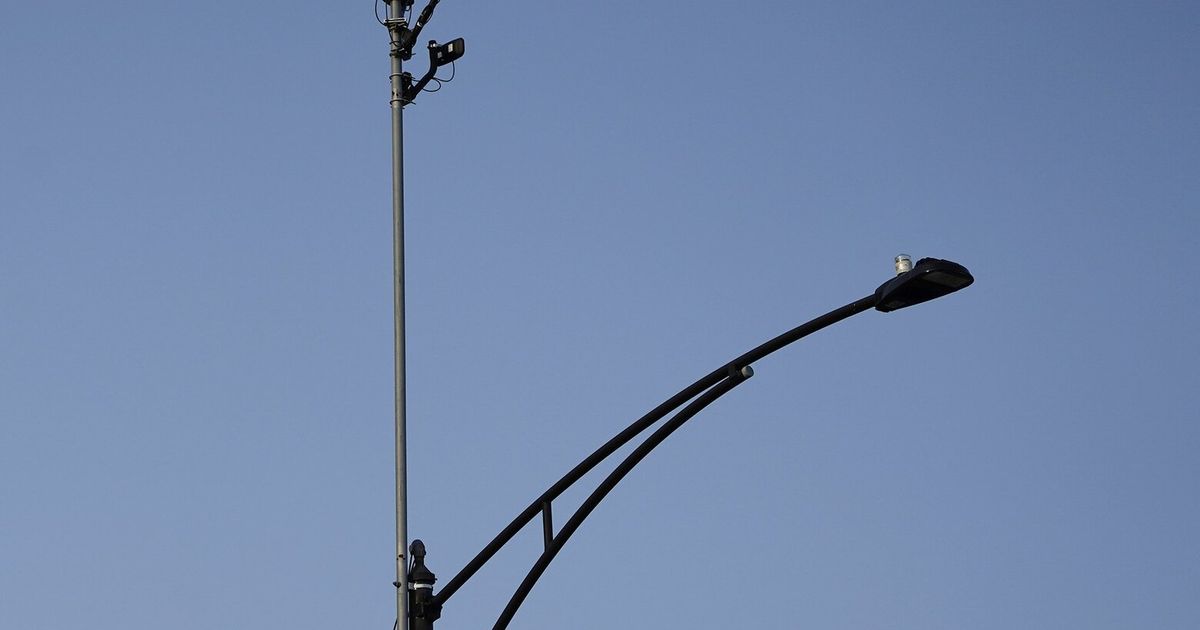Mayor Bruce Harrell is shelving plans to roll out gunshot detection equipment in Seattle, putting the controversial technology on ice yet again after years of back and forth in City Hall.
Several other pieces of technology will soon hit Seattle’s streets as part of a broader “crime prevention technology pilot” from Harrell. But gunshot detection is a hotly debated anti-crime measure locally and nationally — cast by its proponents as a tool for a stretched-thin police department and by its opponents as an expensive and ineffective opening for overpolicing.
The new equipment Harrell announced Friday include closed-circuit cameras on Aurora Avenue North, the downtown Third Avenue corridor and in the Chinatown International District. Harrell also announced an expansion of the city’s automated license plate readers, as well as a “real-time crime center” technology that aggregates various data, dispatch and camera feeds into a single map the police department uses to locate incidents as they unfold.
Although each piece of technology has attracted privacy concerns, the acoustic gunshot technology — often referred to by its proprietary name, ShotSpotter — has garnered the most questions about its efficacy and impact on the neighborhoods where it would be used.
The equipment is intended to ping the police department whenever its microphones pick up the sound of gunfire.
More than 150 cities use the technology and SoundThinking, the company behind ShotSpotter, claims a 97% accuracy rate.
But recently the technology has had some high-profile detractors. Houston’s mayor, John Whitmire, recently called the technology a “gimmick” and announced plans to cancel the city’s $3.5 million contract with ShotSpotter. Chicago’s mayor, Brandon Johnson, has pushed to discontinue the equipment, though the city’s council passed a measure attempting to override him.
SoundThinking has pushed back on these claims, calling them “false and misleading.” Other cities, including Cleveland and Newark, N.J., have expanded the technology.
For his part, Harrell has long pushed for more technology in law enforcement and public safety. As a member of the City Council, he was the earliest booster of body cameras for police officers.
His interest in ShotSpotter goes back to at least 2012. He supported a 2016 announcement from then-Mayor Ed Murray that he intended to use it on Seattle’s streets.
But cost and questions about overpolicing in communities of color have consistently derailed plans.
Now mayor, Harrell’s interest has grown as gunshots in Seattle have increased and police staffing has gone down. So far this year, gun violence incidents have increased by 13.4% when compared to the same period last year, though overall crime is down.
Harrell last year pushed for, and narrowly received, $1.8 million for surveillance technology in his 2024 budget. That kicked off a public comment period, which was extended several times due to the outpouring of reactions, both for and against.
In a statement Friday, Harrell’s office said the decision to shelve the gunshot location technology comes now that “more specific cost estimates have been received” for the suite of technology he’s hoping to roll out. The decision to prioritize the cameras and license plate readers follows “a robust public engagement, research review, and cost analysis process,” the statement reads.
Spokesperson for Harrell, Callie Craighead, said the decision is based on available funding.
“This package balances the need for action, expert advice, and the City’s budget reality to make a positive impact today and prepare us to do more in the future,” Harrell said.
Ralph Clark, CEO of SoundThinking, said the decision was “disappointing” but that he respected it.
“Cities have limited resources and dollars,” said Clark, who has previously donated to Harrell’s political campaigns.
Criminal justice reform-oriented groups, including the ACLU of Washington, have opposed the ShotSpotter technology, as well as broader use of cameras.
Tee Sannon, technology policy program director of the ACLU of Washington, doubted the company’s internal data on efficacy. She said the gunshot location equipment can send police officers on goose chases, leading to wasted time and excessive police presence.
“It is definitely a good thing that we won’t see ShotSpotter in our neighborhoods,” Sannon said Friday, “but it is important to note that it shouldn’t be just based on cost estimates, but rather that the technology is extremely harmful and also ineffective.”
Sannon additionally raised concerns about the other pieces of technology that are moving forward as significant expansions of the surveillance network without enough checks and balances put into place.
For ShotSpotter’s boosters, Harrell’s decision is disappointing.
“For victims, it’s another tool to maybe find the people that shot the guns or murdered somebody,” Victoria Beach, a public safety liaison with the Seattle Police Department, said Friday.

